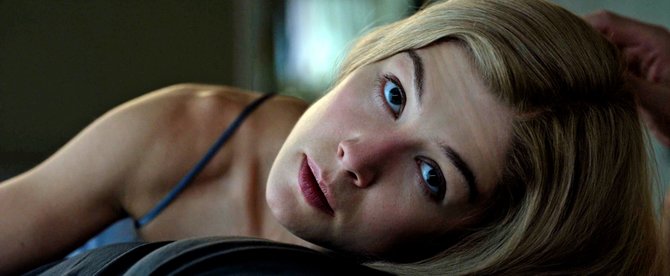Director David Fincher’s expertly written and acted thriller, “Gone Girl,” starring Ben Affleck and Rosamund Pike, is a timely tale of marriage, suspicion and modern media that covers an impressive amount of thematic ground.
What is my spouse thinking? Those are the first and last words that Ben Affleck utters in his latest film, "Gone Girl," and it's the only narration from Affleck's character, Nick Dunne, in the movie. While I may be paraphrasing a bit, that one question is what makes "Gone Girl" such a necessary film for our generation.
With David Fincher, the man behind some of cinema's most thought-provoking thrillers such as "Seven," "Fight Club" and "Zodiac," in the driver's seat, I should have expected more from this slow-burning tale of suspicion. At the same time, I'm glad I saw the film ahead of its hype, as my mild expectations allowed for one of my first blank-slate movie experiences in a long time.
For those who haven't seen the trailers, "Gone Girl" is the story of Nick Dunne, a charismatic former writer, and his wife, Amy, played to absolute perfection by Rosamund Pike. One morning, Nick returns home from the bar he owns and finds signs of a struggle and no sign of Amy. As we learn more and more about what made their five-year marriage tick—or stop ticking, as the case may be—explosive media coverage and stacking evidence make it clear that Nick knows more than he's saying. Of course, as with all masterful thrillers, that's only a small ripple in the water. The wave is coming.
My wife and I saw the movie for our anniversary, which felt eerily fitting. Rather than immediately heralding divorce, as Fincher morbidly joked in interviews, it opened deep discussions on a variety of topics, including honesty, fidelity and our knowledge of each other. If a film can create opportunities for earnest conversation, it's something special.
Below the surface is a seedy story of sex and manipulation, which is not to say the two are completely separate. Sex ranges from vibrant and emotive to abrupt and somewhat disturbing, but oddly, both often feel more like a tool or transaction than an act of love. In fact, the closest thing to love that "Gone Girl" exhibits is Nick's connection with his twin sister, Margo, in a brilliant turn by actress Carrie Coon. Despite having doubts of Nick's innocence, Margo is his stalwart companion through the horrors of TV-induced fame.
The movie also has plenty to say about marriage in modern society. Without giving too much away, both Nick and Amy face financial struggles, which strain their relationship in a remarkably real way. Then, there's also the looming argument of whether they should have children or not. Both are played out through fly-on-the-wall flashbacks that manage to feel just as tense and gripping as the fruitless search for "Amazing Amy."
As with any piece of art, Fincher's "Gone Girl" won't strike a chord with every viewer. The film bears little resemblance to out-and-out action thrillers such as "Taken" or "Jack Reacher," instead relishing in the rich tension of a silent room that follows a shouting match. Some may even find it overly long. Whether it's the right entertainment for you or not, I can't say. But days later, I'm still considering its many underlying themes, and for that, "Gone Girl" is one of the most significant films I've seen in years.



Comments
Use the comment form below to begin a discussion about this content.